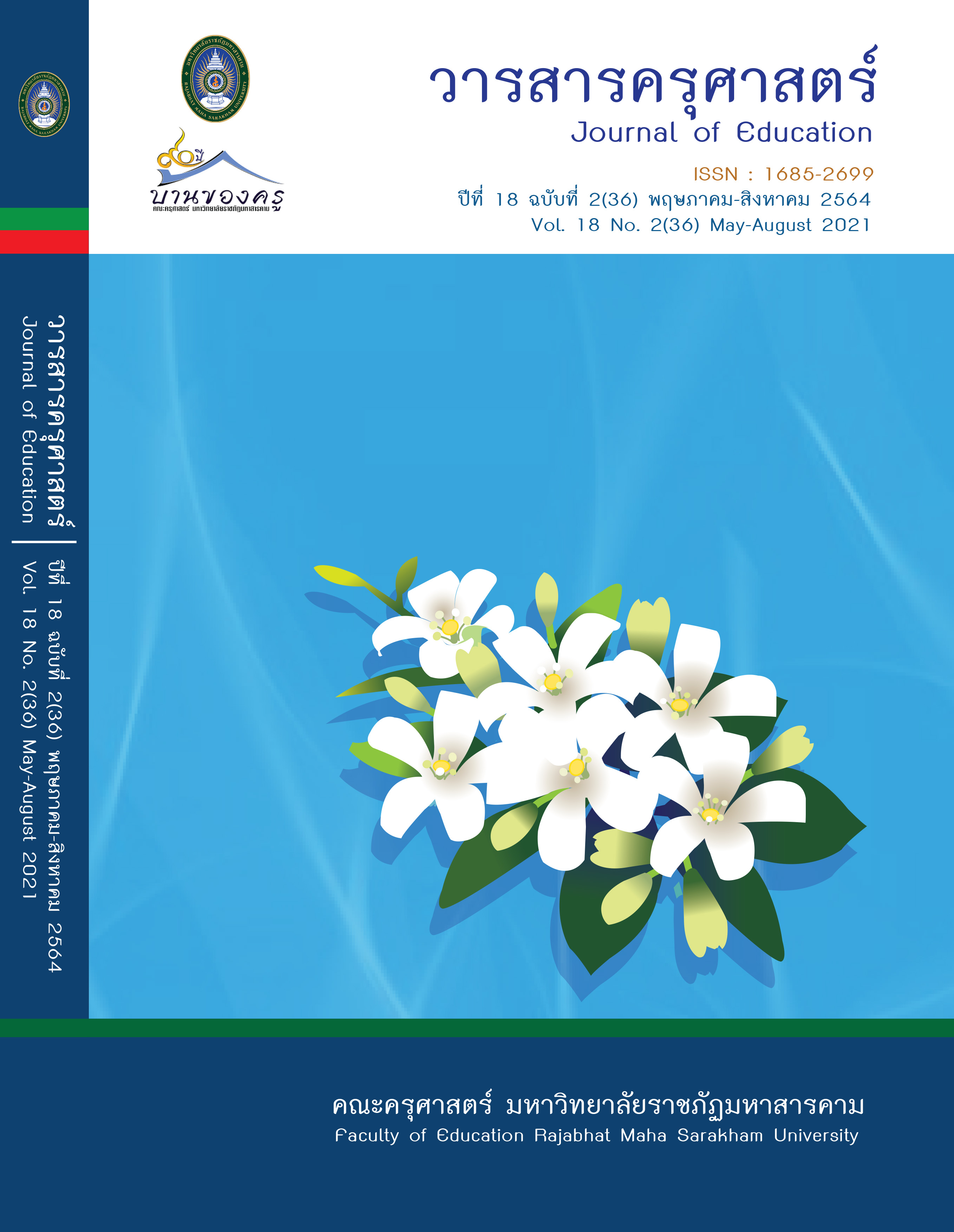The Development oF Computer Assisted Instructional Learning to Promote Thai Reading Achievement for The Seventh Graders
Main Article Content
Abstract
The objectives of the study were: 1) to analyze Thai reading problems of the seventh graders; 2) to develop the media for promoting Thai reading of the seventh graders; 3) to increase Thai reading achievement of the seventh graders. It was applying to participatory action research. The target group comprised 192 of the seventh graders and 10 teachers in Phukraduengwitthayakom School, Phukradueng District, Loei Province. The data was collecting from tests, interviews, and reading instructional media. The instruments were reading tests and interviews. The statistics used for quantitative data analysis included mean, standard deviation, t-test, and content analysis was also applying for qualitative data analysis. The results revealed that 1) The seventh graders' reading problem was a critical reading; 2) students needed computer-assisted instructional learning (CAI) for developing critical reading; 3) the comparison results of critical reading scores showed that the students' average pretest score was 8.17 whereas the average posttest score was 16.38 who means that the student's achievement in Critical Reading was significantly higher after learning with the designed CAI at .05 level.
Article Details
ข้อกำหนดเบื้องต้นที่ผู้นิพนธ์(ผู้ส่งบทความ) ควรทราบ
1. ผู้นิพนธ์ที่ประสงค์จะลงตีพิมพ์บทความกับวารสาร ตั้งแต่เดือนมกราคม 2563 เป็นต้นไป ให้ใช้รูปแบบใหม่ (Template 2563) โดยสามารถดูตัวอย่างได้ที่เมนู GUIDELINES
2. จะตีพิมพ์และเผยแพร่ได้ ต้องผ่านการประเมินจากผู้ทรงคุณวุฒิ (Peer Review)
3. การประเมินบทความโดยผู้ทรงคุณวุฒิ (Peer Review) เป็นแบบ Double Blind
4. การอ้างอิงบทความใช้หลักเกณฑ์ APA (American Psychological Association) คลิก
5. บทความถูกปฏิเสธการตีพิมพ์ ไม่ผ่านการประเมิน ผู้นิพนธ์ขอยกเลิกเองหรือชำระเงินก่อนได้รับการอนุมัติ ทางวารสารไม่มีนโยบายการคืนเงิน
References
เฉลิมลาภ ทองอาจ. (2555, 12 พฤศจิกายน). การอ่านอย่างมีวิจารณญาณ (critical reading): สมรรถนะสำคัญของคนทุกศตวรรษ. https://www.gotoknow.org/posts/509349.
เชาว์ อินใย. (2543). ความรู้พื้นฐานเกี่ยวกับการวิจัย.สถาบันราชภัฏเลย.
ทิศนา แขมมณี. (2545). ศาสตร์การสอนองค์ความรู้เพื่อการจัดกระบวนการเรียนรู้ที่มีประสิทธิภาพ. จุฬาลงกรณ์มหาวิทยาลัย.
พิมพันธ์ เดชะคุปต์ และพเยาว์ ยินดีสุข. (2560). ทักษะ ๗c ของครูยุค ๔.๐. พิมพ์ครั้งที่ 3. สำนักพิมพ์แห่งจุฬาลงกรณ์มหาวิทยาลัย.
ว.วชิรเมธี. (2554). 9 เรื่องเพื่อความก้าวหน้า. ปราณ.
วิจารณ์ พานิช. (2555, 20 สิงหาคม). การจัดการศึกษา 3 ยุค.http://www.gotoknow.org/post/374764.
ลัฐิกา ผาบไชย. (2549). การพัฒนาบทเรียนคอมพิวเตอร์ช่วยสอนเรื่องคำไทยสำหรับนักเรียนช่วงชั้นที่ 3 [วิทยานิพนธ์ปริญญามหาบัณฑิต ไม่ได้ตีพิมพ์]. บัณฑิตวิทยาลัย มหาวิทยาลัยราชภัฏอุตรดิตถ์.
สำนักงานกองทุนสนับสนุนการสร้างเสริมสุขภาพ. (2551, 19 สิงหาคม). สมองกับการอ่าน. http://www.bbl4kid.org/
สำนักงานคณะกรรมการการศึกษาขั้นพื้นฐาน. (2558, 2 ตุลาคม). อึ้ง! นร.ระดับมัธยมมีปัญหาอ่านไม่ออก เขียนไม่ได้ น่าเป็นห่วง กพฐ.จี้โรงเรียนสำรวจ. http://campus.sanook.com/.
อรพันธุ์ ประสิทธิรัตน์. (2530). คอมพิวเตอร์เพื่อการเรียนการสอน. (พิมพ์ครั้งที่ 2).คราฟแมนเพรส.
อภิชาติ เพ็ชรัตน์. (2558). แนวทางการพัฒนาสังคมเพื่อเตรียมความพร้อมการเข้าสู่ประชาคมเศรษฐกิจอาเซียน.วารสารการเมือง การบริหารและกฎหมาย, 8(2), 127-158. https://www.mis.ms.su.ac.th/MISMS01/PDF02/254_20190615_j_75.pdf
อารีรัตน์ ประโยชน์มี. (2551). การพัฒนาบทเรียนคอมพิวเตอร์วิชาภาษาไทย เรื่อง ชนิดของคำชั้นประถมศึกษาปีที่ 6 โดยวิธีสอนแบบนิรนัยกับแบบอุปนัย [วิทยานิพนธ์ปริญญามหาบัณฑิต ไม่ได้ตีพิมพ์]. บัณฑิตวิทยาลัย มหาวิทยาลัยราชภัฏมหาสารคาม.


